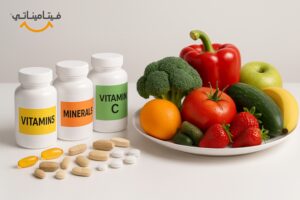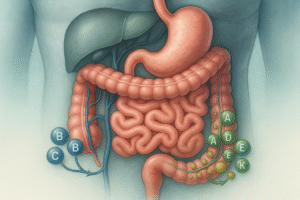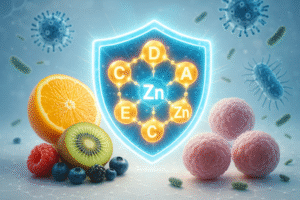Table of Contents
ToggleFood or Supplements — Which Comes First?
Can food alone provide enough vitamins?
This question has become a growing topic of debate in the world of nutrition today.
While some people believe that vitamins and supplements are essential daily, others insist that a healthy, balanced diet is enough on its own.
So, what’s best for our health in the long run?
According to the World Health Organization (WHO), natural food is the best source of vitamins and minerals. Supplements should only be used when the body cannot meet its nutritional needs through diet alone.
Food is not just “calories.” It’s a complex system of nutrients, fibers, and antioxidants that work together to support the body’s vital functions.
What Are Vitamins and Why Does the Body Need Them?
Vitamins are essential organic compounds that help regulate metabolism, immunity, and energy production.
Without them, the body cannot function properly — even in small amounts.
Each vitamin plays a specific role:
Vitamin C: boosts immunity and helps in collagen formation.
Vitamin D: supports bone health and calcium absorption.
Vitamin A: maintains vision and skin health.
Vitamin B complex: aids in energy production and brain function.
Fruits and Vegetables: The Best Source of Natural Vitamins
Fruits and vegetables are among the richest natural sources of essential vitamins:
Vitamin C — found in citrus fruits and red peppers.
Vitamin A — in carrots and sweet potatoes.
Vitamin K — in spinach and broccoli.
Folic acid — in green leafy vegetables, vital for pregnancy and brain health.
The WHO confirms that eating five servings of colorful fruits and vegetables daily can cover most of your vitamin needs.
These foods help maintain immunity, healthy skin, and strong eyesight.
Whole Grains and Nuts: Energy and Nerve Support
Whole grains like oats and brown rice contain B vitamins, which help convert food into energy and support brain function.
Nuts such as almonds and walnuts are rich in Vitamin E, one of the most powerful antioxidants.
A handful of nuts daily can naturally provide essential vitamins and protect cells from oxidative stress.
Meat, Fish, and Eggs: Animal Sources of Vitamins
These foods provide nutrients that plants cannot, such as:
Vitamin B12 — necessary for blood formation and nerve function.
Vitamin D — partially synthesized from sunlight, but also found in fatty fish.
Iron and zinc — vital for strong immunity and metabolic function.
According to the Office of Dietary Supplements (ODS), people who follow vegetarian or vegan diets may need supplements to replace these vitamins.
When Is Food Enough to Get All Vitamins?
A balanced diet is the foundation of good health.
When your meals include a variety of foods, you usually get all the vitamins and minerals your body needs — no supplements required.
Daily Food Diversity: How to Get Every Vitamin
To make sure you’re getting all the nutrients, eat foods of different colors and sources:
Green foods = Vitamin K and folic acid
Red foods = Antioxidants and Vitamin C
Orange foods = Vitamin A
Following this colorful approach ensures that your diet provides enough vitamins — naturally and effectively.
When Food Isn’t Enough: The Role of Supplements
In some cases, diet alone isn’t sufficient — and that’s when supplements become necessary.
1. Pregnancy and Breastfeeding
The WHO recommends that women take folic acid and iron supplements, as it’s difficult to meet these needs through diet alone.
These nutrients prevent anemia and support fetal development.
2. Older Adults
As we age, our ability to absorb vitamins like B12 and D decreases.
That’s why supplements are often necessary for seniors to maintain energy and bone health.
3. Vegetarians and Special Diets
Those who follow strict vegetarian or vegan diets may lack B12, D, and iron, making supplements essential for maintaining optimal health.
4. Chronic Diseases and Malabsorption
Certain conditions like diabetes or intestinal inflammation reduce nutrient absorption.
In such cases, supplements aren’t optional — they’re medically necessary, according to ODS guidelines.
Can Supplements Replace Food?
The short answer: No.
Supplements can help fill nutritional gaps, but they cannot replace real food.
Food contains fibers, enzymes, and plant compounds that are not found in pills or powders.
So, can foods provide enough vitamins?
Yes — in most cases.
But supplements can be valuable allies when the body’s needs exceed what food alone can provide.
Vitamins vs. Dietary Supplements: What’s the Difference?
Vitamins: natural organic substances found in foods.
Supplements: products containing vitamins, minerals, or herbs — designed to compensate for deficiencies.
Both WHO and ODS emphasize that supplements should never be taken without medical advice.
Excessive use can cause side effects, including vitamin toxicity (especially with Vitamin A and D).
Vitamins vs. Minerals: What’s the Difference?
Vitamins are organic compounds — produced by plants or animals.
Minerals are inorganic elements — like calcium, zinc, and iron — that come from the earth and enter our diet through plants and animals.
Both are essential, but they work differently in the body.
Vitamins help trigger chemical reactions, while minerals support structural and electrical functions.
Best Ways to Get Vitamins Daily
The most effective way to get your daily vitamins is through food — not pills.
For example, fat-soluble vitamins (A, D, E, K) are best absorbed when eaten with healthy fats such as olive oil, avocado, or nuts.
This approach allows your body to absorb vitamins efficiently and naturally.
Medical Guidance: Supplements When Needed
Never take supplements without consulting a doctor.
Some supplements may interact with medications or cause side effects.
A healthcare professional can determine the right dosage and type based on your age, diet, and health status.
Conclusion: The Balance Between Food and Supplements
So, do foods provide enough vitamins?
Yes — in most cases.
A varied and balanced diet supplies all the vitamins and minerals your body needs.
Supplements, on the other hand, are supportive tools, not replacements.
The ideal approach is to balance natural food with supplements when medically necessary, under professional guidance.
Remember — prevention begins in the kitchen, not the pharmacy.
Common Signs of Vitamin Deficiency
If you suspect a deficiency, watch for these symptoms:
Fatigue or weakness
Hair loss or brittle nails
Pale or dry skin
Muscle cramps
Poor immunity
Vision problems
If these symptoms persist, consult your doctor for a blood test.
References
World Health Organization (WHO) – Micronutrients
Office of Dietary Supplements (ODS) – NIH
Frequently Asked Questions (FAQs)
1. Are vitamins considered dietary supplements?
Vitamins are part of supplements, but they naturally exist in foods.
2. What’s the difference between natural vitamins and supplements?
Natural vitamins come from food, while supplements are manufactured to compensate for deficiencies.
3. Can supplements replace food?
No, they lack the fibers and phytochemicals found in whole foods.
4. How can I get all my vitamins naturally?
Eat a diverse diet including fruits, vegetables, whole grains, nuts, and lean proteins.
5. What’s the best source of vitamins?
Fresh, natural foods — as confirmed by WHO and ODS.
6. When should I take vitamins with food?
Take fat-soluble vitamins (A, D, E, K) with meals containing healthy fats for better absorption.
7. Do vitamins strengthen immunity?
Yes — especially vitamins C, D, and E, which enhance immune defense and reduce inflammation.
Final Summary
Food is the first and most important source of vitamins.
Supplements are supportive, not a substitute.
So, keep your plate colorful, eat whole foods, and consult your doctor before taking supplements.
PharmD with expertise in pharmaceuticals and a passion for making medical knowledge clear, accurate and accessible to all






